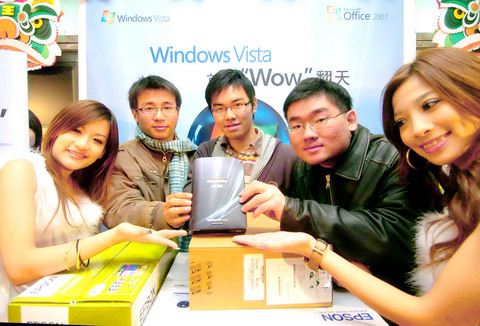Despite the media hype and heavy promotional campaign, Microsoft's Vista operating system (OS) received a lukewarm response at its debut in Taipei yesterday.
Various incentives, such as free photo printers, projectors, or USB drivers, were offered to the first 200 buyers of Vista, but fewer than 70 buyers showed up at 6:30pm, 30 minutes after the official launch.
"The crowd is much smaller compared with the launch of Windows XP five years ago," said Jason Chang (

PHOTO: LIAO YAO TUNG, TAIPEI TIMES
He arrived about an hour before the launch, and his queue number was only 34.
The 40-year-old had tested the beta version of Vista and found some software compatibility glitches, but was still keen to get the latest copy to take advantage of the freebies.
But for Hsieh Hao-cheng (
"Consumers will be enthralled by the new Aero feature," said the 24-year-old engineer, referring to visual effects such as the glass-like interface elements.
He received a limited edition Vista box signed by Microsoft founder Bill Gates, an Epson photo printer, as well as a portable computer running on Intel Centrino Duo processor worth NT$40,000 (US$1,200).
The consumer release of Vista, along with the 2007 Microsoft Office System, was held yesterday in front of Nova, one of Taipei's major IT shops located near the bustling Taipei Railway Station.
Despite the lower-than-expected turnout, Microsoft Taiwan remained upbeat on Vista's impact, which it predicted would be as big as that of Windows 95. Introduced in 1995, Windows 95 marked a milestone in the history of operating systems with its switch from 16-bit disk operating system architecture to 32 bits and introduction of graphics user interface.
"Taiwanese consumers were some of the first in the world to get Vista," Davis Tsai (
Local buyers even beat their US counterparts in getting their hands on fresh Vista boxes given the time difference.
Tsai said the sales of Vista were expected to outpace its predecessors, as it boasts better features such as enhanced security to improve productivity.
Christine Chen (
"General consumers are always the early adopters, and more people will buy the OS after the Lunar New Year and back-to-school period in summer," she said.
Microsoft Taiwan has pumped in lots of marketing dollars to ensure the success of Vista's launch.
In addition to setting up demo stations nationwide, it will hold a "Windows Vista Wow" concert on Sunday, with Mandarin pop stars Jolin Tsai (
The advent of Vista signals the shift to 64-bit architecture from 32 bits, but it came more than five years after the release of Windows XP, making it the longest time span between major Windows releases.

SEMICONDUCTORS: The German laser and plasma generator company will expand its local services as its specialized offerings support Taiwan’s semiconductor industries Trumpf SE + Co KG, a global leader in supplying laser technology and plasma generators used in chip production, is expanding its investments in Taiwan in an effort to deeply integrate into the global semiconductor supply chain in the pursuit of growth. The company, headquartered in Ditzingen, Germany, has invested significantly in a newly inaugurated regional technical center for plasma generators in Taoyuan, its latest expansion in Taiwan after being engaged in various industries for more than 25 years. The center, the first of its kind Trumpf built outside Germany, aims to serve customers from Taiwan, Japan, Southeast Asia and South Korea,

Gasoline and diesel prices at domestic fuel stations are to fall NT$0.2 per liter this week, down for a second consecutive week, CPC Corp, Taiwan (台灣中油) and Formosa Petrochemical Corp (台塑石化) announced yesterday. Effective today, gasoline prices at CPC and Formosa stations are to drop to NT$26.4, NT$27.9 and NT$29.9 per liter for 92, 95 and 98-octane unleaded gasoline respectively, the companies said in separate statements. The price of premium diesel is to fall to NT$24.8 per liter at CPC stations and NT$24.6 at Formosa pumps, they said. The price adjustments came even as international crude oil prices rose last week, as traders

SIZE MATTERS: TSMC started phasing out 8-inch wafer production last year, while Samsung is more aggressively retiring 8-inch capacity, TrendForce said Chipmakers are expected to raise prices of 8-inch wafers by up to 20 percent this year on concern over supply constraints as major contract chipmakers Taiwan Semiconductor Manufacturing Co (TSMC, 台積電) and Samsung Electronics Co gradually retire less advanced wafer capacity, TrendForce Corp (集邦科技) said yesterday. It is the first significant across-the-board price hike since a global semiconductor correction in 2023, the Taipei-based market researcher said in a report. Global 8-inch wafer capacity slid 0.3 percent year-on-year last year, although 8-inch wafer prices still hovered at relatively stable levels throughout the year, TrendForce said. The downward trend is expected to continue this year,

Taiwan Semiconductor Manufacturing Co (TSMC, 台積電), which supplies advanced chips to Nvidia Corp and Apple Inc, yesterday reported NT$1.046 trillion (US$33.1 billion) in revenue for last quarter, driven by constantly strong demand for artificial intelligence (AI) chips, falling in the upper end of its forecast. Based on TSMC’s financial guidance, revenue would expand about 22 percent sequentially to the range from US$32.2 billion to US$33.4 billion during the final quarter of 2024, it told investors in October last year. Last year in total, revenue jumped 31.61 percent to NT$3.81 trillion, compared with NT$2.89 trillion generated in the year before, according to